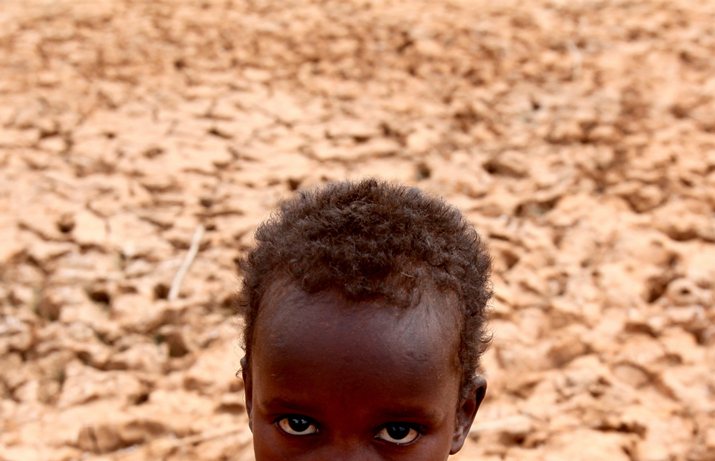|
|||||||||||
|
|
| No Food on the Table |
| Dry spells and floods leave Malawi struggling with severe food shortage |
| By Edwin Nyirongo | VOL. 8 April 2016 |

Young hungry eyes are a common sight in Malawi
As Elenata Chikaonda prepares a dish of chitambe - cowpea leaves - for dinner at her home in Balaka, a district in the Southern Region of Malawi, she is deeply worried.
The mother of three is stressed because the previous evening, her school-going children refused to have chitambe alone for dinner. They told her they were tired of eating "leaves" for lunch and supper and asked for nsima, the maize flour porridge that is Malawi’s staple food. They also warned her they would stop going to school if the situation didn’t change.
"There is no one to help," the widow said, moaning the loss of her husband. "And there is nowhere to go to do piecework to get money for buying maize."
The situation has been worsened by the fact that there is no maize at the depots of the state-owned Agricultural Development and Marketing Corp. (ADMARC), including the one in Utale, where she lives.
"The last time maize supplies came to the depot was on January 8," she said. "I bought 5 kg with a lot of difficulty." The family lived on that for an entire week.
After that, Chikaonda said she resorted to begging for maize bran and discarded flour at the mills.
With no more maize at the ADMARC depot, she had to finally borrow money and turn to maize vendors who are charging prices almost three times higher than at the depots. "The moneylender is coming here often, asking for the money. But even if I get any money, the priority will be to buy food," she said.
Chikaonda is one of thousands of Malawians facing hunger daily, foraging for anything that is edible to stave off starvation.
El Nino wreaks havoc
The food crisis in this southeastern African country is mainly attributed to alternating dry spells and floods that have affected many parts, mostly in the Lower Shire [River] area. They are said to be caused by El Nino, the phenomenon of excessive warming in the Pacific Ocean, resulting in extended dry weather or excessive and damaging rains.
According to the 2015 report by the Malawi Vulnerability Assessment Committee (MVAC) composed of the government, UN agencies and NGOs, 2.8 million people - almost 20 percent of the country’s 16-million population - face starvation in 25 of the 28 districts.
But the chiefs of Rumphi District in the Northern Region have faulted the report, saying more people are affected by hunger.
Food security in Malawi is generally equated with adequate production of maize, which accounts for more than 60 percent of the country’s food production. The last time Malawi faced such a crisis was during the 2012-13 farming season, when 1.63 million people suffered from food insecurity.
The MVAC report said there was a projected deficit of over 200,000 metric tons in 2015-16, against the expected national consumption of 3 million metric tons.
The Minister of Agriculture, Irrigation and Water Development Allan Chiyembekeza, told parliament last May that the government planned to import 60,000 metric tons of maize paying $11.4 million, the money allocated for the exercise in the national budget. But that was too little.
Malawi President Peter Mutharika therefore appealed to development partners and local and international donors to assist his government in mobilizing resources. He said about $119 million was needed for the emergency response.
A number of countries have responded to Mutharika’s appeal. China is one of them. In January, when Chinese Foreign Minister Wang Yi visited Malawi, he announced a Chinese humanitarian assistance of $9.23 million.
Tough times ahead
Malawians who thought the crisis would be over by June, Malawi’s harvesting period, had more bad news. Chiyembekeza’s ministry released the first round of the 2015-16 Agriculture Production Estimates Survey in February, which indicates the harvest will be less than expected.
National maize production is projected at
2.7 million metric tons, which is 2 percent lower than the 2014-15 final estimate, the ministry said in a statement.
Erica Maganga, Principal Secretary in Malawi’s Ministry of Agriculture, told Reuters at the end of February that the government has authorized ADMARC to import 30,000 tons of maize from Zambia, and an expected additional 50,000 tons from Tanzania.
While this may help, John Kazembe, a senior lecturer at Malawi’s Lilongwe University of Agriculture and Natural Resources, said the government could have prevented the crisis since it was predictable.
"This hunger was predictable, especially [due to the] fact that the onset of rainfall was very late [thus] creating a short [maize] growth period. With short-term plans, the country cannot be prepared [for crisis]," Kazembe said.
He also said importing maize was only a short-term remedy. The government should focus on the long term, which entails investing in agriculture infrastructure such as irrigation farming.
On the idea of Malawi moving away from maize to diversify its food production, Kazembe said, "While stakeholders have talked about food diversification, it will take a long time to materialize because [food] is cultural and traditional in nature."
The United States Agency for International Development’s Famine Early Warning Systems Network has said that Southern Africa would continue to suffer from poor rainfall and hot weather in 2016. The food crisis would continue to 2017.
(Reporting from Malawi)
|
|||
| Copyright ChinAfrica All right reserved 京ICP备08005356号 |